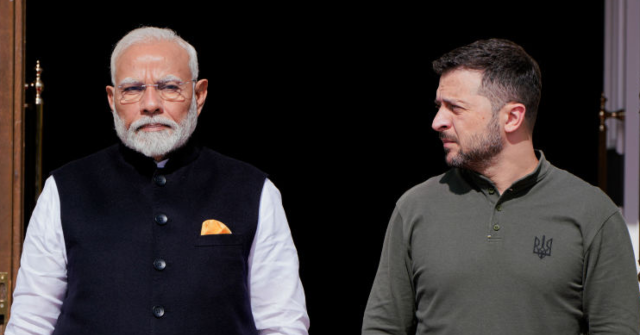Ukrainian President Volodymyr Zelensky held a phone conversation on Monday with his Indian counterpart, Prime Minister Narendra Modi, in which he reinforced President Donald Trump’s position that New Delhi must cut off its purchases of Russian oil.
Zelensky thanked Modi in a public statement for offering “warm words of support” to Ukraine and used diplomatic language to indicate that India had more space to use its international leverage to help his country against the ongoing Russian invasion, which began over a decade ago but escalated to a full-scale conflict in 2022.
Zelensky emphasized the need globally “to limit the export of Russian energy, particularly oil” — a pointed remark given that India has become one of Russia’s most reliable buyers of oil following European sanctions on the Russian fossil fuel industry.
The comments follow President Trump announcing the imposition of a 50-percent tariff on Indian goods, partly in response to India’s ongoing patronization of the Russian oil industry. America and India remain engaged in trade talks to recalibrate the bilateral economic relationship after President Trump announced in April a comprehensive overhaul of America’s trade relationships. India buying Russian oil and maintaining its protectionist measures against imports, particularly in the agricultural sector, have become major irritants preventing the completion of a U.S. trade deal according to reports from both countries.
While Zelensky addressed Russian oil purchases in his statement, the tone was overwhelmingly friendly, an indication that Kyiv and New Delhi have stabilized their relationship after multiple public diplomatic disagreements in the aftermath of the full-scale Russian invasion.
Describing the talk as “long,” Zelensky said the leaders “discussed in detail all important issues — both of our bilateral cooperation and the overall diplomatic situation. I am grateful to the Prime Minister for his warm words of support for our people.”
“It is important that India is supporting our peace efforts and shares the position that everything concerning Ukraine must be decided with Ukraine’s participation,” Zelensky asserted. “Other formats will not deliver results.”
This remark appeared to imply that India is supporting pressure on Trump from European states to invite Zelensky to a scheduled in-person meeting with Russian strongman Vladimir Putin, scheduled for Friday. Mixed reports suggest that the White House is considering such an invite, but no such announcement has been issued at press time — nor has India publicly endorsed inviting Zelensky to the Trump-Putin session.
Elsewhere in his extensive statement on his conversation with Modi, Zelensky added, “I noted that it is necessary to limit the export of Russian energy, particularly oil, to reduce its potential and ability to finance the continuation of this war.”
“It is important that every leader who has tangible leverage over Russia sends the corresponding signals to Moscow,” he asserted, concluding by announcing that he plans to meet with Modi in person in New York during the U.N. General Assembly in September.
Modi published a more concise statement confirming his phone call with Zelensky that did not address Russian oil purchases, meeting in New York, or Trump’s scheduled meeting with Putin.
“I conveyed India’s consistent position on the need for an early and peaceful resolution of the conflict,” Modi said. “India remains committed to making every possible contribution in this regard, as well as to further strengthening bilateral ties with Ukraine.”
Modi engaged Zelensky after a phone call with Putin last week. Russia and India are both members of the BRICS anti-American economic and security bloc, helping ensure that Modi prioritizes its relationship with Russia over Ukraine. India has maintained longstanding ties with Russia for decades forged by Soviet defense equipment sales to India and support of its stance against Pakistan.
The Indian External Affairs Ministry offered a much less specific summary of the phone call with Putin than Zelensky did with his call. Modi, the ministry said, offered Putin India’s “consistent position for peaceful resolution of the conflict.” The ministry added that the two discussed a scheduled visit by Putin to India and that Putin offered Modi an “update” on Ukraine, without elaborating.
India has remained vocally supportive of Russia throughout the war and refused to change that position amid the Trump trade talks. Last week, Modi deployed National Security Adviser Ajit Doval to Moscow to Russian Security Council secretary Sergei Shoigu and celebrate the countries’ “strategic partnership,” even as Trump threatened higher tariffs.
“We are committed to further active cooperation in order to form a new, more just and sustainable world order, ensure the supremacy of international law, and jointly combat modern challenges and threats,” Shoigu told Doval, who confirmed that Putin is expected to visit India this year.
Russia has similarly backed India’s decision to purchase Russian oil, naturally, declaring it a “sovereign” right.
“We believe that sovereign countries should have and do have the right to choose their own trading partners,” Kremlin spokesman Dmitry Peskov declared last week, “partners for trade and economic cooperation, and to choose for themselves the forms of trade and economic cooperation that are in the interests of a particular country.”
Messaging aside, reports from India indicate that New Delhi is slowly shifting away from Russian oil purchases and increasing the percentage of its imports from America. The Deccan Herald, an Indian newspaper, reported last week that Indian state oil refineries have particularly begun cutting back on buying Russian crude, the report indicating that the refineries are turning to the United Arab Emirates (UAE). Days later, Asian News International (ANI) reported a 51-percent surge in Indian purchases of American oil between January and June, citing unnamed Indian government sources.
Follow Frances Martel on Facebook and Twitter.
Read the full article here


